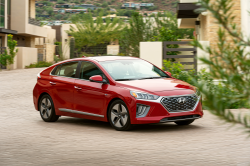— A Hyundai Ioniq class action lawsuit includes SE, SEL and Limited trims that are allegedly missing their Blind Spot Collision Avoidance Assist and Rear Cross Traffic Collision Avoidance Assist systems.
According to Hyundai, an Ioniq with the Rear Cross Traffic Collision Avoidance Assist system has “[r]adar sensors in the rear bumper [that] monitor cross traffic approaching from left and right side of the vehicle during reverse maneuvers, and if necessary appl[ies] emergency braking to prevent from [sic] collision.”
Additionally, an Ioniq with Blind Spot Collision Avoidance Assist has “[r]adar sensors in the rear bumper [which] are used to warn the driver of approaching vehicles in the blind spot area and activate[s] the brakes when there is a collision risk in lane changing maneuvers.”
Model year 2020 Hyundai Ioniq cars were allegedly advertised as including the safety features to assist drivers with avoiding crashes. But the Ioniq class action alleges this causes safety problems as customers may rely on non-existent safety features.
The Owner Who Filed The Hyundai Ioniq Class Action Lawsuit
The Hyundai Ioniq Limited owner who filed the class action says he purchased a 2020 Ioniq in June 2020, but in August a letter from Hyundai arrived and informed the owner his car did not have Blind Spot and Rear Cross Traffic Collision Avoidance Assist systems.
Instead, the Ioniq was equipped with Blind Spot Collision and Rear Cross Traffic Collision Warning systems.
The Ioniq class action lawsuit says the warning systems will only warn the driver of approaching vehicles and vehicles in the Ioniq’s blind spots, but will not automatically apply the brakes to avoid a crash.
The plaintiff alleges the window sticker (Monroney label) specifically says the Ioniq features include “Blind Spot Collision Avoidance Assist” and “Rear Cross Traffic Collision Avoidance Assist” systems, not just the "warning" systems.
The Ioniq owner says he repeatedly contacted Hyundai and the dealership concerning the letter and the missing safety features, but the plaintiff claims nothing did any good and Hyundai offered no solutions or relief.
According to the Ioniq class action, Hyundai deceptively marketed, advertised, sold and leased the 2020 Ioniqs to customers nationwide. And those customers allegedly had no safe or practical method of confirming if the cars were equipped with the systems or verify if the systems functioned properly.
The plaintiff says whether before purchasing the Ioniq or after driving it off the lot, a customer would need to simulate a crash "involving cross traffic during reverse maneuvers and vehicles approaching their Vehicles’ blind spots."
The Hyundai Ioniq class action lawsuit was filed in the U.S. District Court for the Central District of California: Barnett, et al., vs. Hyundai Motor America.
The plaintiff is represented by Shepherd, Finkelman, Miller & Shah, LLP, the Murphy Law Firm, and the Law Office of David H. Abrams.

